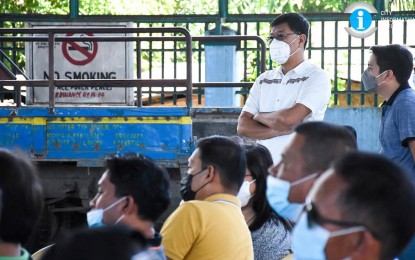
PROPOSED LNG PLANT. Mayor Renato Gustilo of San Carlos City, Negros Occidental (standing, 2nd from right) attends the public scoping for the proposed 300-megawatt liquefied natural gas combined cycle power plant at the Barangay Punao covered court on Wednesday (March 16, 2022). The PHP18.5-billion project was proposed by Reliance Energy Development Inc., a wholly-owned subsidiary of SMC Global Power Holdings Corporation. (Photo courtesy of San Carlos City Information Office)
BACOLOD CITY – Mayor Renato Gustilo of San Carlos City, Negros Occidental on Friday welcomed the 300-megawatt (MW) liquefied natural gas (LNG) combined cycle power plant (CCPP) project being proposed by Reliance Energy Development Inc. (REDI), a wholly-owned subsidiary of SMC Global Power Holdings Corporation.
“The city welcomes such development since it will provide job opportunities to local residents and generate income,” Gustilo said in a statement.
The support of the local government unit is in contrast to the position of the Diocese of San Carlos, which has expressed environmental concerns over the PHP18.5-billion power plant proposed to rise at the San Carlos Ecozone in Barangays Punao and Palampas.
Bishop Gerardo Alminaza, convenor of clean energy consortium REpower Negros, has been quoted in news reports as saying that “using fossil gas, this plant goes against the hope of Negros becoming 100 percent renewable energy powered.”
On Wednesday, REDI held a public scoping or initial preparatory meeting with the host-communities at the Barangay Punao covered court.
During the meeting, representatives of REDI and the Department of the Environment and Natural Resources-Environment Management Bureau discussed with residents the purpose of the project, the processing of the Environmental Compliance Certificate application, and other project information.
Gustilo said any power firm “can invest in the city as long as it is not blacklisted by the national government”, adding that they “know what type of power plants are safe and good for the city”.
He pointed out that the proponent still had to undergo several procedures such as technical scoping and consultative meetings before they can proceed with the project construction.
“With these big projects, I envision San Carlos City to be a powerhub in Visayas and Mindanao,” the mayor added.
The San Carlos Ecozone currently hosts a bio-ethanol and a biomass power plant as well as two solar power farms.
The LNG power plant’s construction phase is set to start on the third quarter of 2022 and the project is targeted to be fully operational in 2024.
It has a proposed area of about 49,000 square meters or 4.9 hectares and will be composed of four units of power blocks with 75-MW capacity each.
According to the project description, it will utilize gas and steam turbines as prime movers for the technology that will be fueled by natural gas that will be delivered to the plant as LNG through carrier ships.
The LNG will be stored in cryogenic storage tanks to be regasified when needed for use in the gas turbines, it added.
In 2018, the Diocese of San Carlos also opposed SMC Global Power’s proposed 300-megawatt coal-fired plant project in the city, which eventually did not push through. (PNA)
